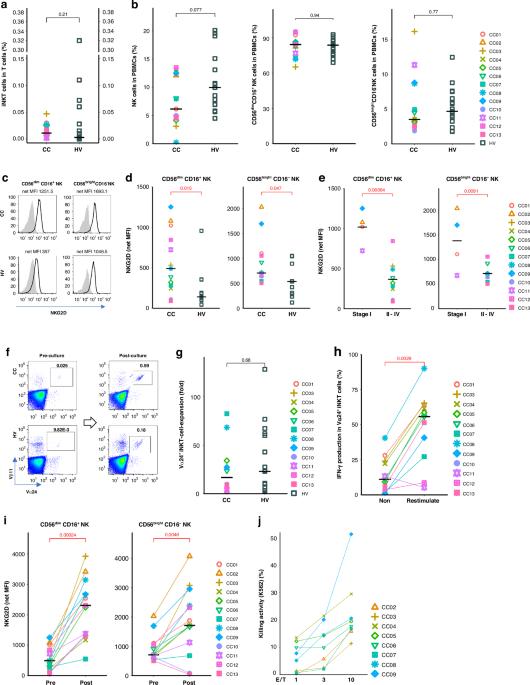Crucial immunological roles of the invasion front in innate and adaptive immunity in cervical cancer
IF 6.4
1区 医学
Q1 ONCOLOGY
引用次数: 0
Abstract
The immunostimulatory actions of innate and adaptive immune responses play a crucial role in the cancer-immunity cycle. Although cervical cancer (CC) exhibits a high recurrence rate, the relation with lymphocytes in the tumor tissue have not been analyzed. We analyzed NKT, NK, and T cells, not only in peripheral blood (PB), but also tumor tissue through histological analysis from 23 patients with CC collected before treatment. A correlation of them between PB and the tumor tissue were assessed. We detected functional NKT and NKG2Dhi NK cells and effector CD4+ Tregs in PB. In the tumor, we detected the infiltration of LAG-3+ TIM-3+ CD4+ and CD8+ T cells rather than NK cells particularly in the invasion front (IF) by fluorescent multiplex immunohistochemistry. The heatmap and correlation analysis revealed that LAG-3+ TIM-3+ CD8+ T cells are highly associated with CD69+ CD103− exhausted CD8+ T cells. We identified the statistical relationship between CD4+Tregs in PB and the number of LAG-3+ TIM-3+ CD4+ T cells in the IF, which may be related to recurrence in patients with CC. LAG-3+ TIM-3+ T cells located in the IF may play a key role in regulation of the tumor immune microenvironment.

侵袭前沿在宫颈癌先天性免疫和适应性免疫中的关键免疫学作用。
背景:先天性免疫反应和适应性免疫反应的免疫刺激作用在癌症-免疫循环中起着至关重要的作用。虽然宫颈癌(CC)的复发率很高,但尚未分析其与肿瘤组织中淋巴细胞的关系:方法:我们不仅对外周血(PB)中的 NKT、NK 和 T 细胞进行了分析,还通过组织学分析对 23 名宫颈癌患者治疗前的肿瘤组织进行了分析。评估了外周血与肿瘤组织之间的相关性:结果:我们在PB中检测到了功能性NKT和NKG2Dhi NK细胞以及效应CD4+ Tregs。在肿瘤中,我们通过荧光多重免疫组化检测到 LAG-3+ TIM-3+ CD4+ 和 CD8+ T 细胞而非 NK 细胞的浸润,尤其是在侵袭前沿(IF)。热图和相关性分析表明,LAG-3+ TIM-3+ CD8+ T细胞与CD69+ CD103- 精疲力竭的CD8+ T细胞高度相关。我们确定了 PB 中 CD4+Tregs 与 IF 中 LAG-3+ TIM-3+ CD4+ T 细胞数量之间的统计学关系,这可能与 CC 患者的复发有关:结论:位于IF中的LAG-3+ TIM-3+ T细胞可能在调节肿瘤免疫微环境中发挥关键作用。
本文章由计算机程序翻译,如有差异,请以英文原文为准。
求助全文
约1分钟内获得全文
求助全文
来源期刊

British Journal of Cancer
医学-肿瘤学
CiteScore
15.10
自引率
1.10%
发文量
383
审稿时长
6 months
期刊介绍:
The British Journal of Cancer is one of the most-cited general cancer journals, publishing significant advances in translational and clinical cancer research.It also publishes high-quality reviews and thought-provoking comment on all aspects of cancer prevention,diagnosis and treatment.
 求助内容:
求助内容: 应助结果提醒方式:
应助结果提醒方式:


